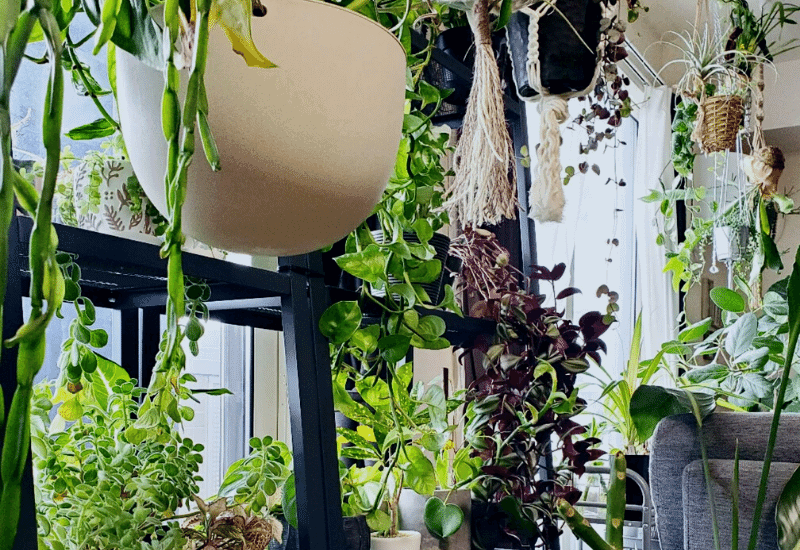
A room is not a real indoor garden without some houseplants with long vines, trailing houseplants that drape over hanging basket, shelves and tables can turn an empty corner or shelf, into a beautiful oasis.
Indoor vining plants in fact give that vertical dimension to your green arrangements you really need to bring a little piece of the tropics to your home.
What is more, many houseplants that grows long are exotic and tropical, and… have you ever seen a rainforest without vines? But which ones are best?
Most indoor climbing plants come from tropical and exotic regions, they are fast growing and easy to grow.
Some are very popular, like pothos or philodendron, and your choice will depend on the overall look, size and growing conditions, especially the light available in the room.
The range, therefore, goes from a long vine which needs little light to put on top of a cupboard to a small one that loves light to grow on your high plant stand.
And, of course, we have found many excellent plants for you. Reading this article will be like Tarzan traveling from vine to vine across a rain forest… Along the way, you will get to know many beautiful vining house plants that thrives indoors.
Let’s first look at how to use vines as a pro in your home or office, then we will see each and every one of these amazing houseplants.
What Indoor Vine Plants Can Offer You
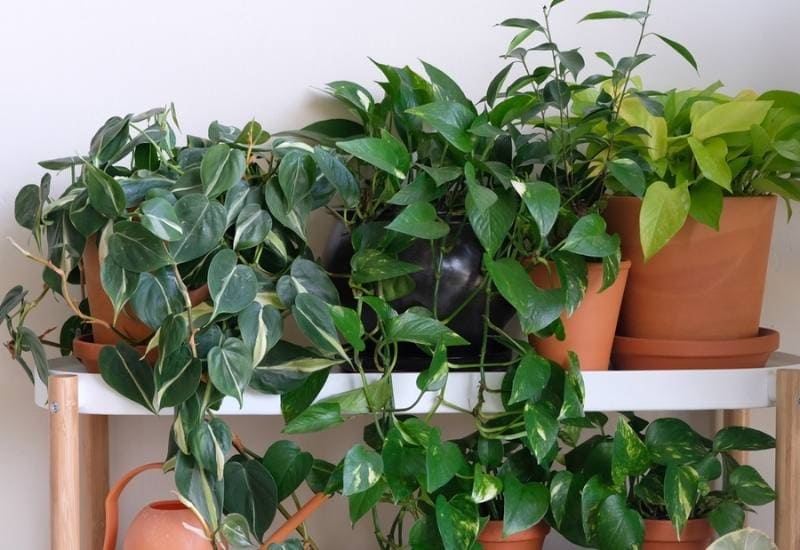
If you walk into a room, the presence of an indoor vine plant will become clear immediately. Maybe you won’t notice it consciously, but subconsciously you will. An indoor vine plant already makes the room “different”. Why?
Vines, as we said, give vertical green lines to your room. This adds a new dimension to the design, the composition etc.
Vines smooth hard hedges of furniture. This way, they make the room look softer.
Climbing Vines give a sense of integration between the room, the furniture and the plants in it. Look at them, the leaves that partly cover a shelf, the fact that they bring together different layers and heights… All this gives a sense of unity, of integration to your room.
Vines are essential for the tropical look. We said it, but don’t forget it.
Vines give a sense of “established garden”. This is a gardening point. You know when a garden looks like it’s been there for a long time? Vines, ivy in particular give that look. The same applies to your houseplants. With vines, they will look like they have always been there.
Now, without further ado, let’s see all the indoor vine plants we have chosen for you.
15 Indoor Climbing Vine To Refresh Your Home With Tropical Tones
These insanely beautiful indoor vine and climbing plants will instantly create that tropical feeling in any room of your home
1: Golden Pothos (Epipremnum aureum)
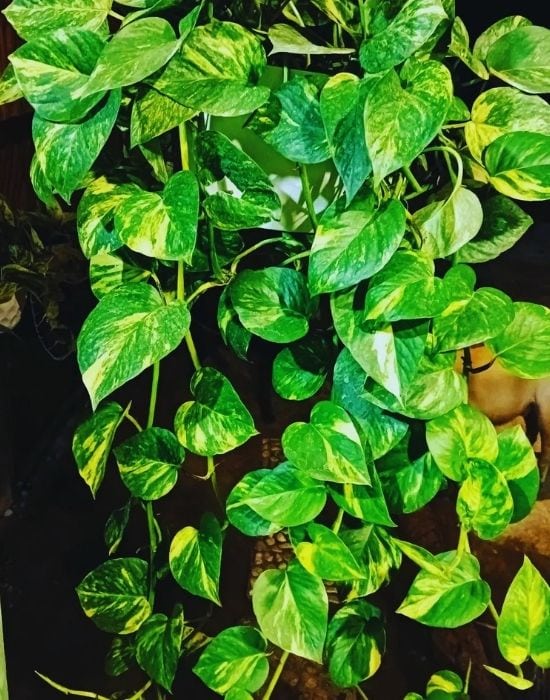
Golden pothos is arguably the most common low light indoor vine in the world. So much has been said about already… Its gold and green heart shaped leaves have been gracing shelves and cupboards all over the world for decades.
It is very easy to grow and to propagate. You just need to put a cutting in a jug of water and you will have a new plant. This means that you don’t even need to buy one.
Just get a tip cutting from a friend and that bring bookshelf will never look the same again! Pothos os also very easy to trim and to grow hydroponically. All you need is a beautiful vase, jug or any water container…
Golden pothos is very playful plat that is also an excellent air purifier. There is no reason why you should not have one.
2: Grape Ivy (Cissus rhombifolia)
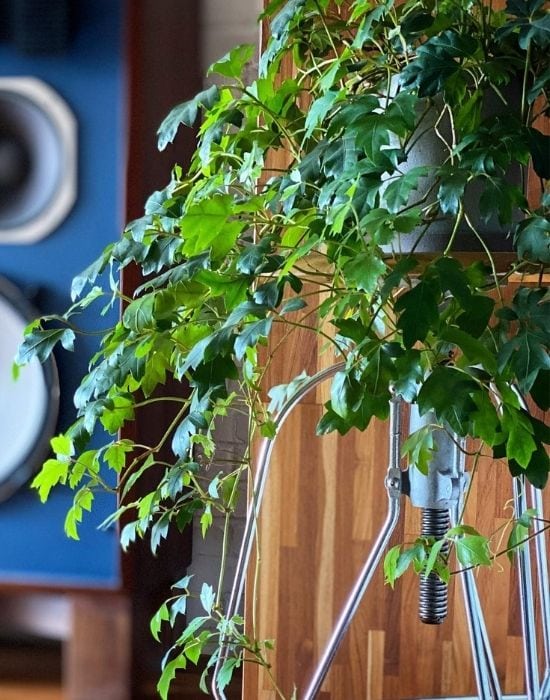
Grape ivy is a small trailing vine with lovely foliage texture. In fact, the many little leaves form a delicate composition and when hit by sunlight, they give a very beautiful “glitter” effect too. It is ideal as a trailing plant for beautiful containers, which it will drape gracefully.
There is also a taller version, oddly called miniature grape ivy (Cissus striata), which has small leaves, and it can be easily cut back to fit small pots and vases, coffee tables, working desks and other limited spaces.
Both species have a medium grow rate, which can be handy, because many vines grow fast and they need constant trimming. These are plants you can “forget” on the shelf and they will not cause you trouble.
3: Creeping Fig (Ficus pumila)
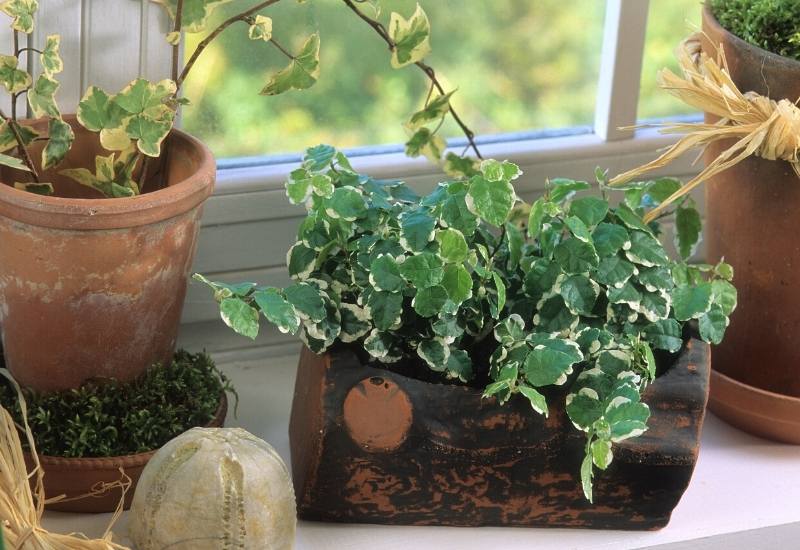
Creeping fig is a beautiful evergreen vine you can grow indoors, but also outdoors. The regularly shaped, elliptical leaves are regularly arranged along the vines.
They are usually green, but there are variegated varieties, with green and cream or even green and white foliage. These have a more striking effect.
It looks great in hanging baskets and in bright places. It brings a sense of “lightness” with its fresh looking but also delicate leaves. It is also perfect to cover walls on balconies and terraces on top of being a houseplant.
4: Arrowhead Plant (Syngonium podophyllum)
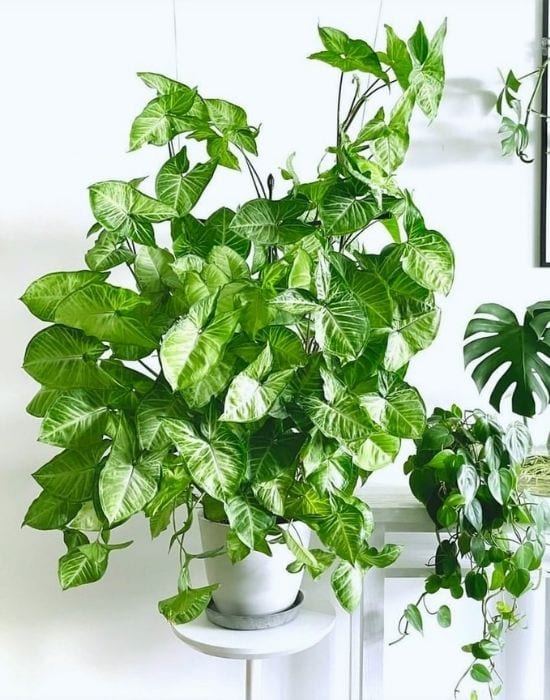
Arrowhead plant is an exotic looking vine with striking foliage. The leaves are arrow head shaped, as the name suggests, they are large and broad (up to 6 inches long, or 10 cm).
They have a rich deep green color, but also lighter stripes on them. What is more, the leaves of this vine are very glossy and shiny.
It is an excellent plant to bring that lush, rich, florid look of tropical forests to any corner of your room.
It will look great on tables, where you may need to cut it back, but also on shelves, where you can let it grow a bit longer.
5: String of Pearls (Senecio rowleyanus)
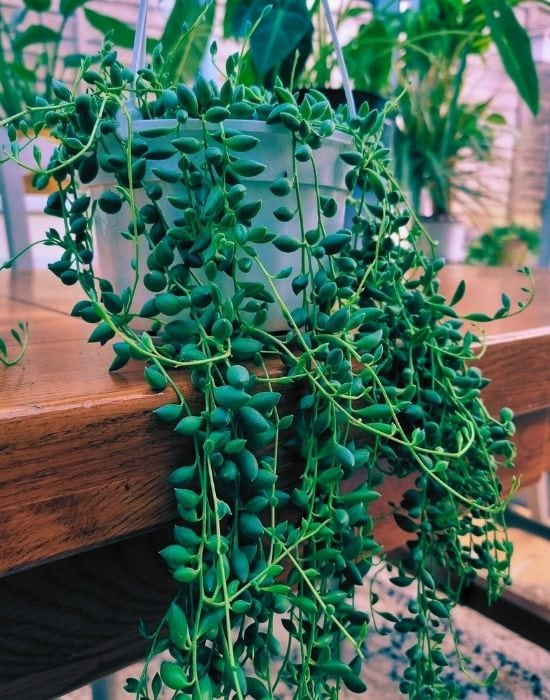
String of pearls is an amazing succulent vine. The name comes from the fact that the leaves are perfectly spherical, so they look like many green pearls growing on the long and thin vines, that look like strings.
It is a very playful and very architectural plant to have in a well lit room.To some, the leaves may loom like peas. In fact the color is very similar.
But be very careful: this plant is seriously poisonous. Only grow it away from the reach of children and do not leave any fallen “pearls” lying around.
6: Betel Leaf Plant (Piper betle)
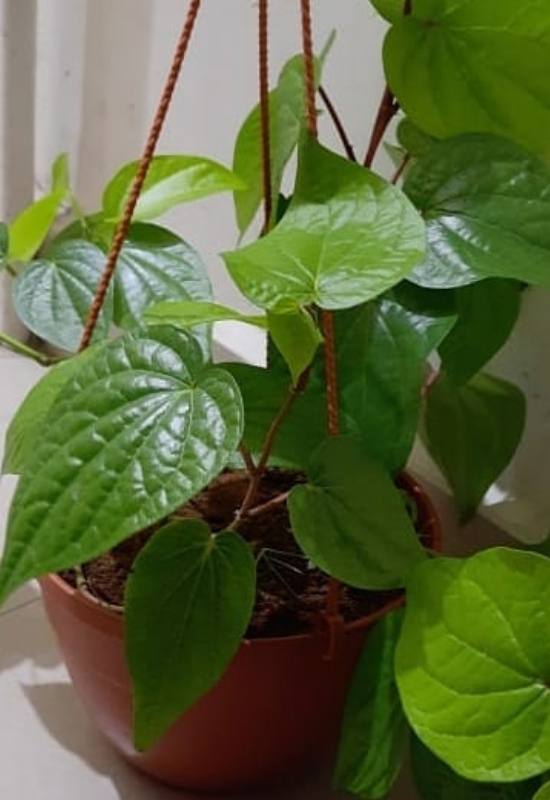
Betel leaf plant is a beautiful vine, but one that you can use as “backdrop”. It has heart shaped, emerald green laves, forming a fairly thick “bushy” effect.
While it is beautiful, it has a more “temperate” look than many vines we use as houseplants. It is not as showy.
Despite this, it is actually a tropical plant from South and East Asia, where it is used for medicinal purposes.
For this reason, it will look great even in “humble” rooms, like in kitchens. It will also add a lot to compositions, in pots and containers alike.
You can grow it indoors or outdoors, where it wants constant humidity and part shade.
7: Hoya Hearts (Hoya kerrii)
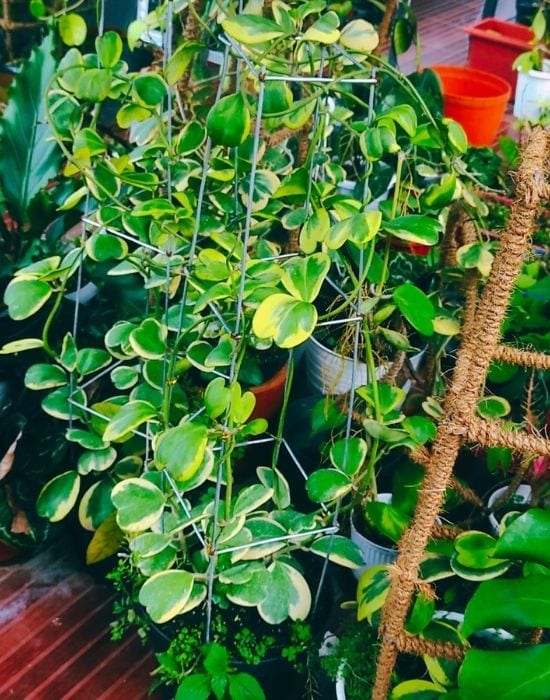
Hoya hearts is beautiful climbing vine from southeast Asia. As the name suggests, the leaves are heart shaped, rich emerald green in color and quite smooth and glossy.
The shape of the foliage makes it popular in some countries as a Valentine Day present, especially in the UK. And of course, this is a very romantic looking indoor vine, as well as an exotic looking one.
Most of the vines we have seen have no flowers, or inconspicuous flowers. Hoya hearts, on the other hand, will produce round inflorescences of beautiful star shaped flowers.
There are white with a purple dot in the middle and look like they are made of sugar. It’s a very sweet indoor vine indeed!
8: wandering Jew (Tradescantia zebrina)
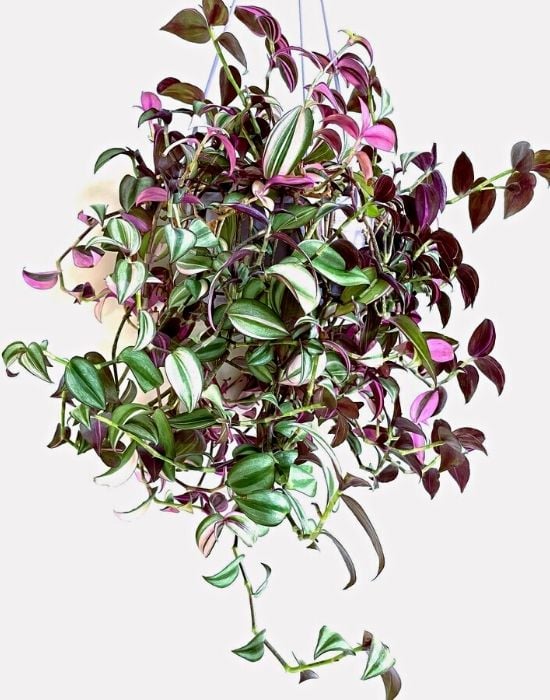
Inch plant is an easy to grow trailing perennial with amazing colors. It is also called wandering Jew, and it has beautiful opposing elliptical leaves with purple and green white stripes.
That’s why the Latin name refers to “zebras”. It will also blossom with beautiful, three leaved flowers.
Inch plant also looks partly translucent in the right light, and it the colors have a range of interesting r.
Be particular about light exposure, the health and quality of the coloring of this vine really depends on it.
9: Wax Ivy (Senecio macroglossus)
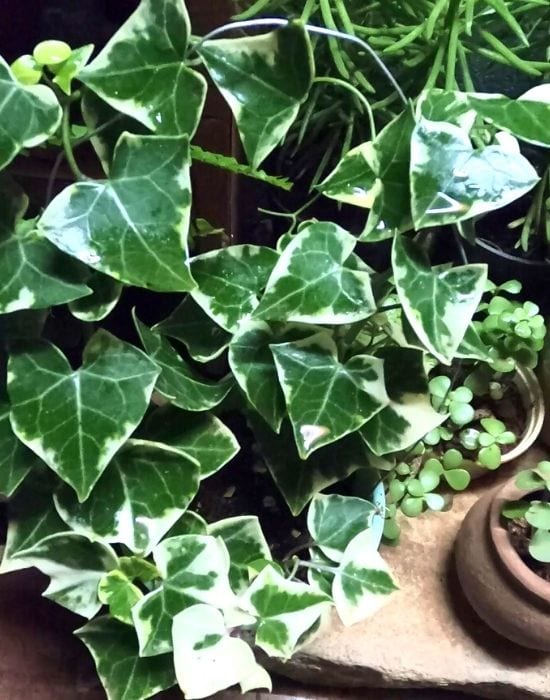
Wax ivy really looks like English ivy, with similar leaves and habit. But the leaves are a bit waxier, more glossy and light green in color. Some also have touches of cream.
What matters is that this evergreen vine will live well indoors, unlike English ivy, which is only suitable outdoors.
It forms lovely arching vines that fill with fresh looking and outdoor looking foliage. It looks ideal in an informal place, because the appearance is slightly wild and untamed.
10: Philodendron Nanegalense (Philodendron nanegalense)
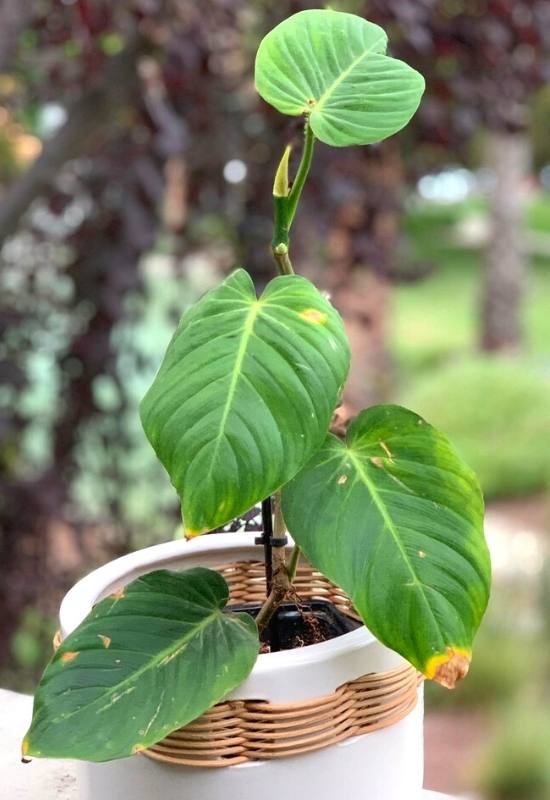
Philodendron nanegalense is one of the many varieties if philodendron that are vines and excellent for indoors. But nanegalense has very elegant and at the same tine showy vines.
The leaves are spread out on the vine, and they are long and broad, very glossy and emerald green. They come almost horizontally on the vines, and they have deep grooves where the veins run.
This is a special variety from Ecuador, and if you want to grow it, you will help its preservation, as it is critically threatened.
Alternatively, there are many philodendrons that are vines, suitable for indoors and even easier to find. So many, in fact, that they are the subjects of another article.
11: Forest Cactus (Lepismium bolivianum)
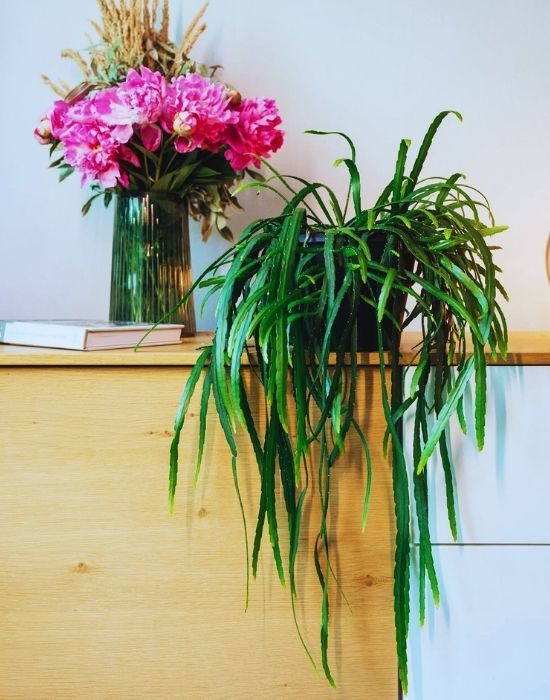
Forest cactus is an original looking, evergreen trailing houseplant. It looks like a light green, thin cactus, but its stems drop down the containers and have long succulent leaves on them.
In a way it looks like a cactus, in another way it looks like a temperate trailing vine…
It is excellent for the “individual” touch you want to give to your room, especially if light and airy. It is perfect for hanging baskets or if you want puzzling but lively branches falling from your shelves…
I forgot… it also has beautiful white and pink flowers!
12: String of Hearts (Ceropegia woodii)
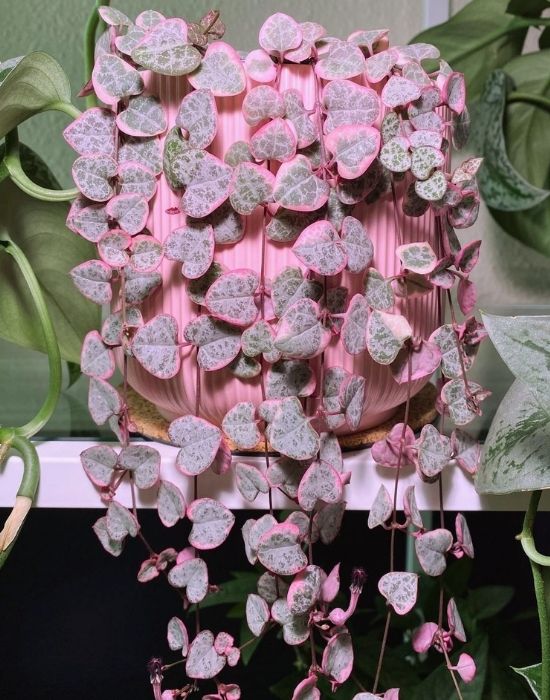
String of hearts is a vine that looks like a loose necklace of heart shaped leaves. They remind me a bit of the leaves of cyclamen, with similar patterns of shades of green…
They are not thick on the vine, but dispersed along it. The effect is quite delicate and artistic. Add the succulent texture of the leaves and the effect is complete. It can be sued to form a natural bead curtain.
It is a very “comforting” plant, which fits well in a place charged with emotional value. Even a bedroom is suitable, because, being a succulent, it will not give off carbon dioxide at night, but still oxygen!
13: String of Nickels (Dischida numullaria)
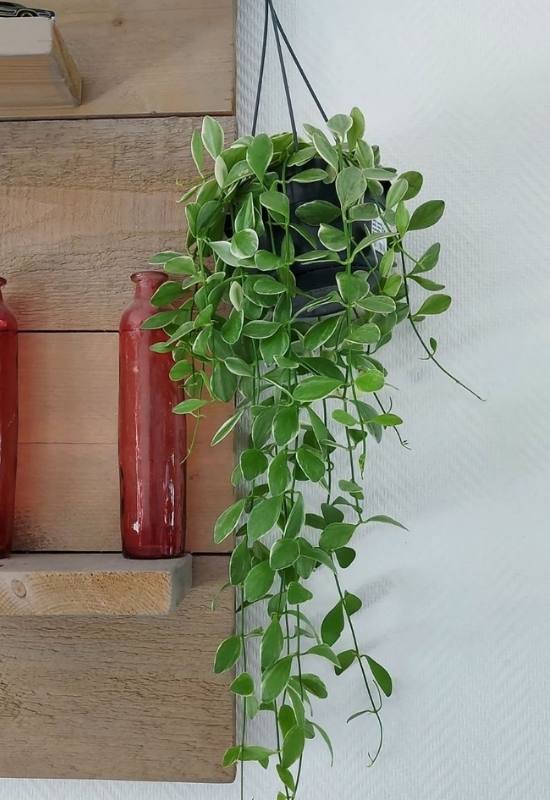
String of nickels is a very plastic indoor vine. It is playful and artistic at the same time. The perfectly round, succulent leaves are shiny and jade green in color. So, you will be forgiven if you confuse it for an oriental looking necklace.
This is a vibrant vine, it is full of light and fresh energy. Children will love it, and adults too. It really brings up a warm smile on everybody’s face. For this reason, this is a great plant for a brightly lit room.
However, keep it away from children. This plant has a very toxic and irritant sap. It’s a pity because they love it…
14: Kangaroo Vine (Cissus antarctica)
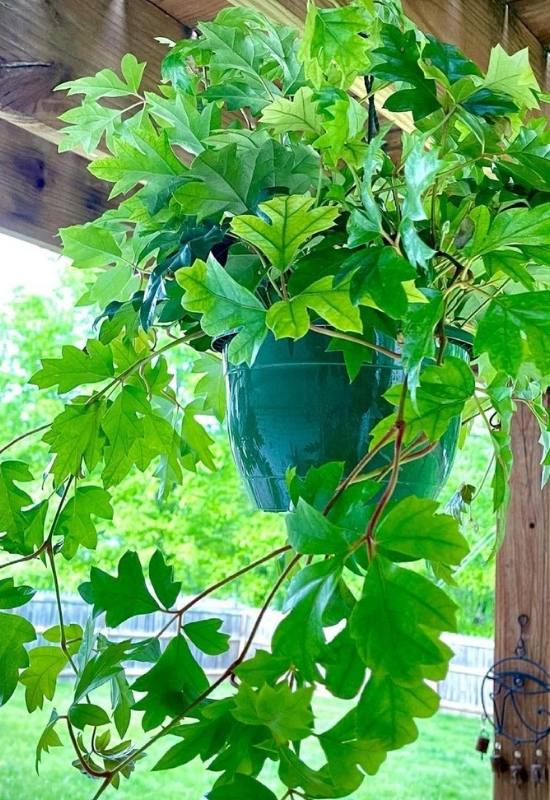
Kangaroo vine is can be described as “fresh”, “breezy” and “light”. Its leaves look delicate, like made of cotton, or some light material.
They are heart shaped with very artistic serrated edges. The color is light and bright green, so, it “looks like spring”, if you want a general impression.
The appearance is herbaceous and bushy, like a temperate p forest plant rather than exotic.
It is a good plant for light and informal rooms. It may not take center stage in a room, but it will contribute to its vitality and freshness.
I can see it well in a kitchen, or in a similar environment, with white or cream walls.
15: Rex Begonia Vine (Cissus discolor)
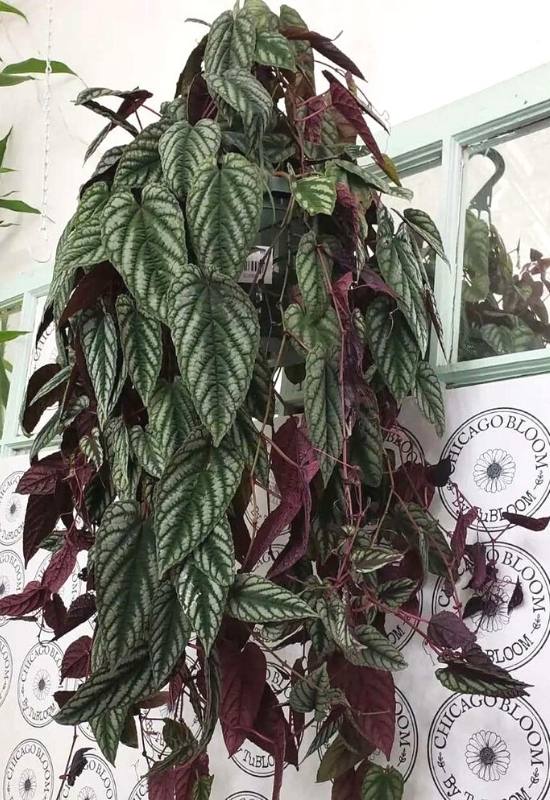
Rex begonia vine is not actually a begonia, but its beautiful variegated leaves look like those of begonia. They are broad, heart shaped and elongated, with serrated edges. They are dark green with almost white (greenish) patterns on them.
They tend to point down, and they grow on trailing vines of a warm purple color, which is then taken up on the underside of the leaves… Late in the season, leaves may actually turn fully purple!
This plant is excellent for informal settings. The shrub like appearance of the vines and its almost herbaceous look make it look artistic but natural at the same time
Vining Indoors
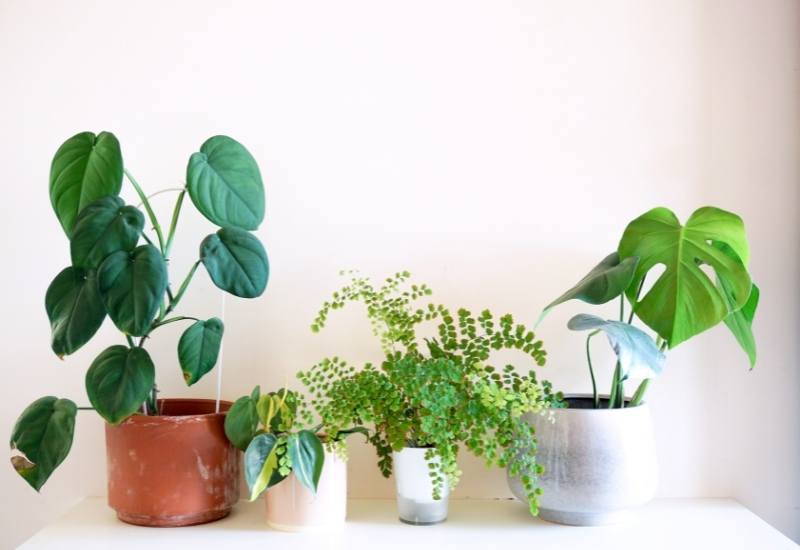
How many beautiful vines can you grow indoors! Many are exotic, but not all. Some have spherical leaves, many have heart shaped leaves.
Some are green, others purple or variegated. Some grow in bright light, others in medium and even in low light.
So, for sure there is one that suits your needs. But all will add that very important extra touch to your room that only vines can offer!

Written By
Amber Noyes
Amber Noyes was born and raised in a suburban California town, San Mateo. She holds a master’s degree in horticulture from the University of California as well as a BS in Biology from the University of San Francisco. With experience working on an organic farm, water conservation research, farmers’ markets, and plant nursery, she understands what makes plants thrive and how we can better understand the connection between microclimate and plant health. When she’s not on the land, Amber loves informing people of new ideas/things related to gardening, especially organic gardening, houseplants, and growing plants in a small space.
